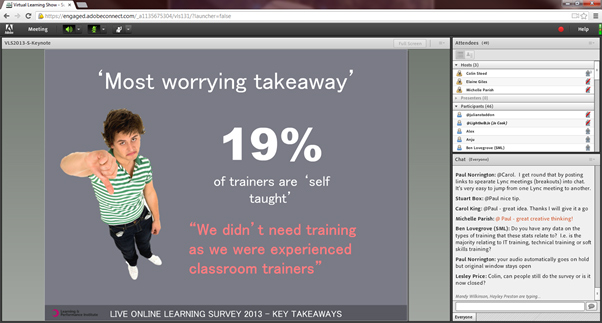Tweets can be followed from the whole session with the hash tag #VLS13
Live Online Learning in Europe
Colin Steed kicked off the first day of the second Virtual Learning Show with his keynote speech based on survey results about the adoption and perceptions of online learning. There were some statistics coming out, with a lot of companies already using online learning and planning to increase it, others not.
The business drivers for going online with training were as to be expected:
- Cost saving 88%
- Geographic reach 82%
- Access remote workers 44%
- Increasing Skills 36%
- Performance Support 28%
However whilst lower, I was interested to see that the increase of skills and performance support were included and It’s great to see these two important parts of our education-work world gaining traction.
Colin also talked through the findings about the barriers to adopting online learning, including:
- Lack of support from management 35%
- Lack of support from trainers 34%
- Lack of support from users 61%
- Lack of support from IT department 29%
- Technical issues 64%
The resistance from users is quite high, so there’s a lot of work to do around the marketing and communication of benefits about online training.
However the barriers reduce once online training has taken place:
- Lack of support from management goes down to 16%
- Lack of support from trainers down to 12%
- Lack of support from users down to 38%
- Lack of support from IT down to 17%
- Technical issues to 50%
At one point in the discussion Craig Taylor rebutted the point about the barrier for learners having no quiet place for online learning. He quoted the Itiel Dror research about this.
I do like it when people want to argue/rail against the research from minds immeasurably superior to many of ours 😉 #VLS13
— Craig Taylor (@CraigTaylor74) June 20, 2013
The survey results moved on to learner feedback about online training, where it’s really great to see such a positive feeling, with 59% of people being positive about benefits and only 9% commenting that they still preferred classrooms.
Colin talked about his takeaways from the survey and his most worrying was that 19% of trainers are self-taught about online learning. His worry, quickly echoed and agreed with in the chat room, was that trainers were already experienced and therefore would be fine in the online classroom.
“Online training is different set of skills” experienced trainers can’t just walk into virtual classrooms #VLS13
— Jo Cook (@LightbulbJo) June 20, 2013


